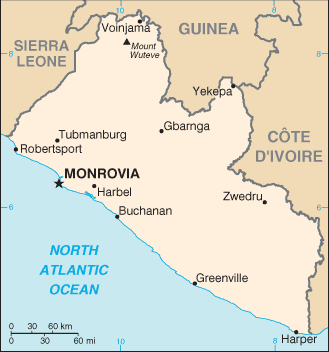Welcome to the Virtual Education Wiki ~ Open Education Wiki
Liberia: Difference between revisions
(added cats SSA and COI - and self-cat) |
No edit summary |
||
| Line 96: | Line 96: | ||
[[Category:Sub-Saharan Africa]] | [[Category:Sub-Saharan Africa]] | ||
[[Category:Countries of interest]] | [[Category:Countries of interest]] | ||
[[Category:VISCED]] | |||
Revision as of 20:47, 26 July 2011
Partners situated in Liberia
Liberia in a nutshell

Liberia, officially the Republic of Liberia, is a country on the west coast of Africa, bordered by Sierra Leone, Guinea, Côte d'Ivoire, and the Atlantic Ocean. As of the 2008 Census, the nation is home to 3,476,608 people and covers 111,369 square kilometres (43,000 sq mi).
Its capital is Monrovia. Liberia has a hot equatorial climate with most rainfall arriving in summer with harsh harmattan winds in the dry season. Liberia's populated Pepper Coast is composed of mostly mangrove forests while the sparsely populated inland is forested, later opening to a plateau of drier grasslands.
The history of Liberia is unique among African nations, notably because of its relationship with the United States. It is one of the few countries in Africa, and the only country in West Africa, without roots in the European Scramble for Africa. Founded as a colony by the American Colonization Society in 1821-22, it was created as a place for slaves freed in the United States to emigrate to in Africa, on the premise they would have greater freedom and equality there.
Slaves freed from slave ships also were sent there instead of being repatriated to their countries of origin. These freed slaves formed an elite group in Liberian society, and, in 1847, they founded the Republic of Liberia, establishing a government modeled on that of the United States, naming Monrovia, their capital city, after James Monroe, the fifth president of the United States and a prominent supporter of the colonization.
A military-led coup in 1980, overthrew then-president William R. Tolbert, which marked the beginning of a period of instability that eventually led to a civil war that left hundreds of thousands of people dead and devastated the country's economy. Today, Liberia is recovering from the lingering effects of the civil war and related economic dislocation.
Source : http://en.wikipedia.org/wiki/Liberia
Liberia education policy
Liberia education system
Higher education
Universities in Liberia
Both public and private universities and colleges are attended by university students. Private universities are popular among Liberian students and families who can afford tutition. Private universities often provide better quality education, access to technology, well staffed libraries and on campus transportation for students and university staff. As with the rest of Liberian educational institutions after civil war, Liberian universities are currently being reconstructed and funded to provide all students with equal access to classes, studies, technology and education.
Public University
- University of Liberia, Monrovia, Africa's oldest non-European institute of Higher Learning
- William V.S. Tubman University, Cape Palmas, formerly William V.S. Tubman College of Technology
- Stella Maris Polytechnic
Private University
- Cuttington University, Suacoco, oldest private and coeducation university in Africa
- A.M.E. Zion University, Monrovia
- United Methodist University, Monrovia
- Booker T. Washington Institute, Kakata
Source : http://en.wikipedia.org/wiki/List_of_universities_in_Liberia